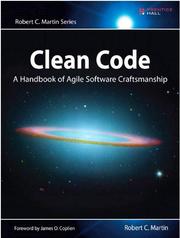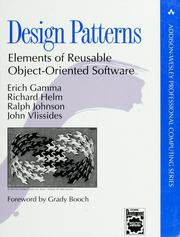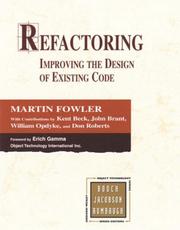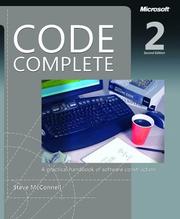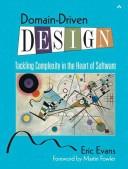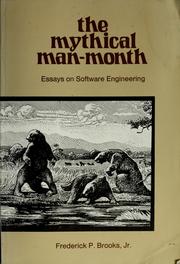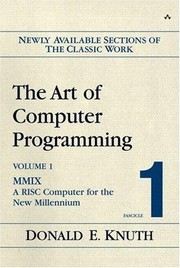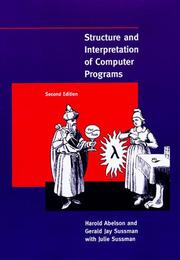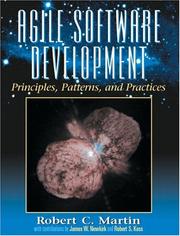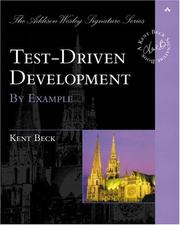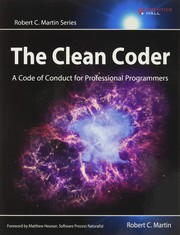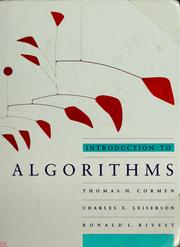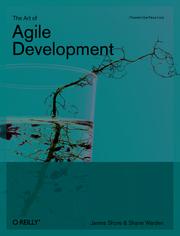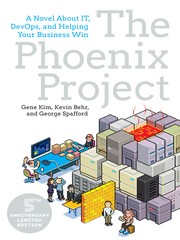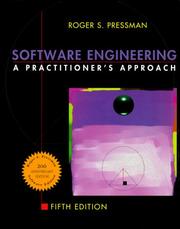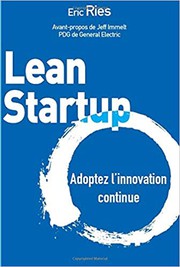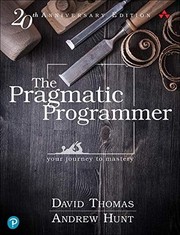Are you looking to expand your knowledge in the world of software development? Whether you’re a seasoned developer or just starting out, a good book on software development can be an invaluable resource. In this article, we’ve compiled a list of the 20 best software development books that cover a wide range of topics, from programming languages and best practices to project management and software architecture. These books have been carefully selected to provide you with the most comprehensive and up-to-date information in the field. So, if you’re ready to take your skills to the next level, dive into our list and start building your software development library today!
Contents
- 1 20 Best Software Development Books
- 2 Clean Code
- 3 Design Patterns: Elements of Reusable Object-Oriented Software
- 4 Refactoring: Improving the Design of Existing Code
- 5 Code Complete
- 6 Domain-Driven Design: Tackling Complexity in the Heart of Software
- 7 The Mythical Man-Month: Essays on Software Engineering
- 8 Introduction to the Theory of Computation
- 9 The Art of Computer Programming
- 10 Structure and Interpretation of Computer Programs
- 11 Agile Software Development, Principles, Patterns, and Practices
- 12 Test-Driven Development: By Example
- 13 Patterns of Enterprise Application Architecture
- 14 The Clean Coder: A Code of Conduct for Professional Programmers
- 15 Introduction to Algorithms
- 16 The Art of Agile Development
- 17 The Phoenix Project: A Novel About IT, DevOps, and Helping Your Business Win
- 18 Software Engineering: A Practitioner’s Approach
- 19 The Lean Startup: How Today’s Entrepreneurs Use Continuous Innovation to Create Radically Successful Businesses
- 20 Clean Code: A Handbook of Agile Software Craftsmanship
- 21 The Pragmatic Programmer: Your Journey to Mastery
- 22 Final Thoughts on Best Software Development Books
- 23
20 Best Software Development Books
Clean Code
by Robert C. Martin
Clean Code by Robert C. Martin is a renowned book about software development that emphasizes the importance of writing clean, readable, and maintainable code. In this book, Martin delves deep into the principles and practices of writing clean code, providing valuable insights and practical advice for developers of all levels. He discusses the significance of naming conventions, code structure, and formatting, and how they can impact the overall quality of the codebase. Martin also addresses the importance of writing unit tests and refactoring existing code to improve its clarity and functionality.
Throughout the book, Martin uses real-world examples and case studies to illustrate the impact of clean code on software development projects. His writing style is engaging and accessible, making it easy for readers to grasp the concepts and apply them in their own work. Clean Code is a must-read for any developer who is passionate about writing high-quality code and improving their skills in the art of software development.
Design Patterns: Elements of Reusable Object-Oriented Software
by Erich Gamma, Richard Helm, Ralph Johnson, and John Vlissides
Design Patterns: Elements of Reusable Object-Oriented Software, often referred to as the “Gang of Four” book, is a classic in the world of software development. This influential book, written by Erich Gamma, Richard Helm, Ralph Johnson, and John Vlissides, provides timeless insights into the world of object-oriented design.
With a focus on reusable, flexible, and efficient design solutions, this book offers a comprehensive overview of essential design patterns that can be applied across various software development projects. It presents a catalog of recurring design problems and their solutions, providing a common language for developers to communicate and collaborate.
Through practical examples and in-depth explanations, the authors guide readers through the principles of object-oriented design and the application of design patterns to solve real-world problems. Whether you’re a seasoned developer or a newcomer to the field, this software development book is an invaluable resource for enhancing your understanding of design patterns and their role in creating high-quality, maintainable software.
Refactoring: Improving the Design of Existing Code
by Martin Fowler
Refactoring: Improving the Design of Existing Code by Martin Fowler is a classic book on software development that offers invaluable insights into the art of improving existing code. Fowler presents a comprehensive guide on how to enhance the design, readability, and maintainability of software systems through the process of refactoring.
The book about software development introduces the concept of refactoring as a disciplined technique for restructuring code without changing its external behavior. With practical examples and clear explanations, Fowler demonstrates various refactoring patterns and best practices that developers can apply to make their code more efficient and adaptable.
Whether you’re a seasoned developer or a novice in the field of software development, this software development book is an essential resource for mastering the art of code improvement. It equips readers with a deep understanding of how to identify and address code smells, eliminate duplication, and create a more maintainable codebase. Refactoring is a must-read for anyone passionate about writing clean, elegant, and high-quality code.
Code Complete
by Steve McConnell
Code Complete by Steve McConnell is a classic book on software development that provides comprehensive guidance and best practices for writing high-quality code. This insightful book about software development covers a wide range of topics, including coding style, construction techniques, debugging, and refactoring.
McConnell offers practical advice on how to design and implement software systems effectively, making it an essential read for both novice and experienced developers. The software development book also delves into the psychology of programming, exploring the cognitive aspects of coding and the impact of human factors on software quality.
With its clear, concise language and real-world examples, Code Complete is a valuable resource for anyone involved in software development. Whether you’re a programmer, software engineer, or project manager, this book will help you enhance your coding skills and deliver more reliable and maintainable software.
Domain-Driven Design: Tackling Complexity in the Heart of Software
by Eric Evans
Domain-Driven Design: Tackling Complexity in the Heart of Software by Eric Evans is a groundbreaking book on software development that focuses on creating complex systems that are centered around the core domain. Evans introduces the concept of domain-driven design as a way to tackle the intricacies and challenges of software development by placing the domain at the forefront of the design process. The book provides practical guidance and strategies for developers to align their software design with the domain and business requirements, resulting in more effective and maintainable systems.
Evans delves into the importance of collaboration between technical and domain experts, emphasizing the need for a shared understanding of the domain to drive the design and development process. He also explores the use of modeling and design patterns to capture domain concepts and complexities, enabling developers to build software that truly reflects the domain it serves. Domain-Driven Design offers valuable insights and approaches for anyone involved in software development, making it an essential read for developers, architects, and project managers.
The Mythical Man-Month: Essays on Software Engineering
by Frederick P. Brooks Jr.
The Mythical Man-Month: Essays on Software Engineering by Frederick P. Brooks Jr. is a classic book on software development that offers timeless insights into the challenges of managing large-scale programming projects. Originally published in 1975, Brooks’ collection of essays delves into the complexities of software development and the human factors that influence its success or failure.
Brooks introduces the concept of the “mythical man-month,” which highlights the misconception that adding more manpower to a late project will speed up its completion. He also discusses the intricacies of project management, team dynamics, and the impact of technological advances on software development.
With his engaging writing style and wealth of real-world experiences, Brooks provides valuable lessons for anyone involved in software development. Whether you’re a seasoned professional or a newcomer to the field, this book about software development will challenge your assumptions and broaden your understanding of the complexities involved in creating software.
Introduction to the Theory of Computation
by Michael Sipser
Introduction to the Theory of Computation by Michael Sipser is a renowned book on the principles of computer science and the theory behind computation. This book delves into the fundamental concepts of automata, computability, and complexity, providing a comprehensive understanding of the theoretical underpinnings of software development.
Sipser’s writing style is engaging and accessible, making complex topics easy to grasp for readers at all levels of expertise. The book covers a wide range of topics, from finite automata and regular languages to Turing machines and undecidability, offering a thorough exploration of the theoretical foundations of computation.
Whether you’re a student studying computer science or a professional looking to deepen your understanding of the theoretical aspects of software development, this book about software development is an invaluable resource. Sipser’s Introduction to the Theory of Computation is a must-read for anyone interested in gaining a deeper insight into the theoretical underpinnings of computation and its applications in software development.
The Art of Computer Programming
by Donald E. Knuth
The Art of Computer Programming is a renowned and comprehensive series of books on the topic of software development. Authored by Donald E. Knuth, a prominent computer scientist, the series of books delve into various aspects of algorithms, data structures, and the art of programming. Knuth’s writing is known for its depth and precision, making it an essential resource for anyone in the field of software development.
Originally published in the 1960s, the series has since been updated and expanded to reflect the evolution of technology and programming practices. Knuth’s meticulous approach to the subject matter has earned him the respect of programmers and computer scientists around the world.
Whether you are a seasoned professional or a student just starting out in the field of software development, The Art of Computer Programming is a valuable resource that provides valuable insights and knowledge about the intricacies of programming and algorithm design.
Structure and Interpretation of Computer Programs
by Harold Abelson and Gerald Jay Sussman
Structure and Interpretation of Computer Programs is a classic book on software development written by Harold Abelson and Gerald Jay Sussman. This influential text takes a unique approach to teaching programming by focusing on the fundamental principles and techniques that underlie computer programs. Through a series of engaging and thought-provoking examples, the authors demonstrate how to think like a computer scientist and create elegant, efficient, and maintainable software.
Readers will explore a wide range of topics, including programming language design, data abstraction, and the art of debugging. The book also delves into the broader implications of computing, touching on issues such as artificial intelligence and the philosophy of programming. With its clear, insightful explanations and challenging exercises, Structure and Interpretation of Computer Programs is a must-read for anyone serious about mastering the craft of software development.
Agile Software Development, Principles, Patterns, and Practices
by Robert C. Martin
Agile Software Development, Principles, Patterns, and Practices by Robert C. Martin is a renowned book on software development that provides a comprehensive overview of agile methodologies, principles, and best practices. This book is a valuable resource for developers, project managers, and teams looking to improve their software development processes.
Robert C. Martin, also known as Uncle Bob, shares his expertise and insights on agile development, emphasizing the importance of flexibility, collaboration, and continuous improvement. The book covers a wide range of topics including agile principles, design patterns, refactoring, and test-driven development.
Readers will gain a deep understanding of how to apply agile principles to their software projects, and learn practical techniques for creating high-quality, maintainable code. With its clear and engaging writing style, Agile Software Development, Principles, Patterns, and Practices is a must-read for anyone seeking to enhance their skills and knowledge in the field of software development.
Test-Driven Development: By Example
by Kent Beck
Test-Driven Development: By Example by Kent Beck is a groundbreaking book on software development that introduces the concept of writing tests before writing code. Beck takes a hands-on approach to teaching the reader how to create high-quality, reliable software through the practice of test-driven development (TDD). This book about software development provides a step-by-step guide, using real-world examples and practical exercises to demonstrate the TDD process in action.
Readers will learn how to write tests to define the desired functionality of their code, then implement the code to pass those tests. The book emphasizes the importance of automated testing and the benefits of writing clean, maintainable code. By following the principles outlined in Test-Driven Development, developers can improve their productivity, reduce bugs, and create software that is easier to maintain and extend.
Whether you are a seasoned developer or just getting started in the field of software development, this software development book is a must-read for anyone looking to enhance their skills and produce higher-quality code.
Patterns of Enterprise Application Architecture
by Martin Fowler
Patterns of Enterprise Application Architecture by Martin Fowler is a renowned book on software development that delves into the essential patterns and practices for building robust and scalable enterprise applications. Fowler, a leading expert in the field, provides valuable insights into designing and structuring software systems to meet the complex demands of modern businesses.
This software development book covers a wide range of topics including architectural patterns, database patterns, and messaging patterns. It offers practical guidance on how to tackle common challenges in enterprise application development, such as managing transactions, handling concurrency, and structuring business logic.
With its clear and concise explanations, this book about software development is a valuable resource for developers, architects, and anyone involved in building enterprise applications. Whether you’re a seasoned professional or a newcomer to the field, Patterns of Enterprise Application Architecture is an indispensable guide for mastering the art of designing and building robust software systems.
The Clean Coder: A Code of Conduct for Professional Programmers
by Robert C. Martin
The Clean Coder: A Code of Conduct for Professional Programmers by Robert C. Martin is a must-read for anyone in the software development industry. This insightful book about software development goes beyond just writing code and delves into the professional ethics and behaviors that every programmer should embody. Robert C. Martin, also known as ‘Uncle Bob’ in the software development community, provides practical advice and real-world examples to help programmers navigate the complex landscape of their profession.
With a focus on professionalism, communication, and continuous learning, The Clean Coder challenges readers to think critically about their work and their impact on the larger software development community. Whether you’re a seasoned developer or just starting your career in the field, this software development book will inspire you to strive for excellence and uphold the highest standards of professionalism in your work. It’s a valuable resource for anyone who wants to elevate their career and make a positive contribution to the world of software development.
Introduction to Algorithms
by Thomas H. Cormen, Charles E. Leiserson, Ronald L. Rivest, and Clifford Stein
Introduction to Algorithms is a comprehensive and widely acclaimed book on software development that provides a thorough introduction to the fundamental concepts of algorithms. Written by Thomas H. Cormen, Charles E. Leiserson, Ronald L. Rivest, and Clifford Stein, this book covers a broad range of topics, including sorting and searching algorithms, data structures, graph algorithms, and dynamic programming.
By presenting complex algorithms in a clear and accessible manner, the authors make this book about software development an invaluable resource for students, professionals, and anyone looking to deepen their understanding of algorithms and their applications. The book also includes numerous examples, exercises, and problems to help readers develop their problem-solving skills and gain practical experience in implementing algorithms.
Whether you’re a beginner or an experienced programmer, this software development book offers a solid foundation in algorithm design and analysis, making it an essential addition to any developer’s library.
The Art of Agile Development
by James Shore and Shane Warden
The Art of Agile Development, written by James Shore and Shane Warden, is a comprehensive and practical guide for anyone looking to understand and implement agile methodologies in their software development projects. This book on software development provides a clear and accessible overview of agile principles and practices, offering valuable insights and actionable advice for teams looking to improve their development processes.
With a focus on collaboration, adaptability, and continuous improvement, this software development book offers practical techniques and real-world examples to help teams embrace agile development and deliver high-quality software efficiently and effectively. Whether you’re new to agile methodologies or looking to deepen your understanding, The Art of Agile Development provides a valuable resource for anyone involved in software development.
The Phoenix Project: A Novel About IT, DevOps, and Helping Your Business Win
by Gene Kim, Kevin Behr, and George Spafford
The Phoenix Project is a captivating book on software development that takes readers on a thrilling journey through the world of IT, DevOps, and business strategy. Written by Gene Kim, Kevin Behr, and George Spafford, this novel follows the story of an IT manager, struggling to save his company from a disastrous software project that threatens to sink the entire business.
As the protagonist navigates through the chaos of daily IT operations, he discovers the principles of DevOps and begins to implement them in his organization. Through this process, he learns valuable lessons about teamwork, communication, and leadership, ultimately transforming the company’s IT department and helping the business thrive.
This book about software development is a must-read for anyone interested in understanding the intersection of technology and business. It offers a compelling narrative that brings to life the challenges and triumphs of IT professionals, while providing practical insights into the world of DevOps and its impact on organizational success.
Software Engineering: A Practitioner’s Approach
by Roger S. Pressman
Software Engineering: A Practitioner’s Approach by Roger S. Pressman is a comprehensive and practical guide for anyone interested in the world of software development. This renowned book on software development provides a thorough understanding of the principles, techniques, and best practices of software engineering.
Pressman’s approach is both insightful and hands-on, making it an essential resource for both students and professionals in the field of software development. The book covers a wide range of topics, including software processes, requirements engineering, software design, testing, and project management.
With its clear and concise writing style, this software development book is accessible to readers of all levels of expertise. It also includes real-world case studies and examples, providing valuable insights into the practical application of software engineering principles.
Whether you are a beginner looking to grasp the fundamentals of software development or an experienced practitioner seeking to enhance your skills, Software Engineering: A Practitioner’s Approach is an indispensable resource that will help you navigate the complexities of software development.
The Lean Startup: How Today’s Entrepreneurs Use Continuous Innovation to Create Radically Successful Businesses
by Eric Ries
The Lean Startup by Eric Ries is a groundbreaking book on software development that introduces a revolutionary approach to building and growing successful businesses. Ries challenges traditional business practices and presents a methodology that emphasizes continuous innovation, fast iteration, and customer feedback. The book provides valuable insights and practical advice for entrepreneurs and aspiring business owners, guiding them through the process of creating and launching successful startups in today’s dynamic and rapidly changing market.
Ries introduces the concept of the Minimum Viable Product (MVP) and emphasizes the importance of validated learning, enabling entrepreneurs to make informed decisions based on real data and customer feedback. By adopting a lean and agile approach, businesses can minimize waste, reduce risks, and ultimately create radically successful businesses. The book about software development is a must-read for anyone in the startup world, offering a blueprint for building sustainable and innovative businesses in an uncertain and competitive environment.
Clean Code: A Handbook of Agile Software Craftsmanship
by Robert C. Martin
Clean Code: A Handbook of Agile Software Craftsmanship by Robert C. Martin is a must-read for anyone in the software development industry. This influential book on software development is a comprehensive guide to writing clean, efficient, and maintainable code. It provides practical advice, best practices, and real-world examples to help developers improve their coding skills and produce high-quality software.
Robert C. Martin, also known as Uncle Bob, shares his wealth of experience and expertise in this book about software development, covering topics such as naming, functions, comments, formatting, and error handling. He emphasizes the importance of writing code that is easy to understand, modify, and extend, ultimately leading to a more productive and successful development process.
Whether you are a seasoned professional or a novice in the field of software development, Clean Code offers valuable insights and actionable techniques that can elevate your coding practices and contribute to the overall success of your projects.
The Pragmatic Programmer: Your Journey to Mastery
by David Thomas, Andrew Hunt
The Pragmatic Programmer: Your Journey to Mastery is a renowned book on software development that provides a comprehensive guide to mastering the craft of programming. Written by David Thomas and Andrew Hunt, this influential book about software development offers timeless advice and practical tips for aspiring and seasoned developers alike. Through a series of thought-provoking anecdotes and real-world examples, the authors delve into the essential principles and practices that lead to successful software development.
Readers will discover valuable insights on topics such as code writing, debugging, testing, and automation, as well as the importance of continuous learning and adaptability in the ever-evolving landscape of software development. With a focus on efficiency, flexibility, and innovation, The Pragmatic Programmer equips its readers with the mindset and tools necessary to navigate the challenges of modern software development.
Whether you’re a novice programmer or a seasoned professional, this software development book is an indispensable resource for anyone looking to elevate their skills and approach to software development.
Final Thoughts on Best Software Development Books
In conclusion, these 20 best books about Software Development offer a wealth of knowledge and insight for both aspiring and experienced developers. Whether you’re looking to improve your coding skills, understand software architecture, or delve into the world of agile development, these books cover a wide range of topics essential for anyone in the field. With practical advice, case studies, and expert guidance, these books are invaluable resources for anyone looking to excel in the world of software development.
Which book about Software Development is best?
The best book on Software Development can vary with personal preference, but three widely recommended titles are:
- Clean Code by Robert C. Martin,
- Design Patterns: Elements of Reusable Object-Oriented Software by Erich Gamma, Richard Helm, Ralph Johnson, and John Vlissides,
- Refactoring: Improving the Design of Existing Code by Martin Fowler.
Each offers valuable insights and could be a great starting point.
What are the best books to learn about Software Development?
For those looking to learn about Software Development, there is a wealth of literature that can provide a comprehensive understanding of the subject. Some of the most highly recommended books include:
- Clean Code by Robert C. Martin,
- Design Patterns: Elements of Reusable Object-Oriented Software by Erich Gamma, Richard Helm, Ralph Johnson, and John Vlissides,
- Refactoring: Improving the Design of Existing Code by Martin Fowler,
- Code Complete by Steve McConnell,
- Domain-Driven Design: Tackling Complexity in the Heart of Software by Eric Evans,
- The Mythical Man-Month: Essays on Software Engineering by Frederick P. Brooks Jr.,
- Introduction to the Theory of Computation by Michael Sipser,
- The Art of Computer Programming by Donald E. Knuth,
- Structure and Interpretation of Computer Programs by Harold Abelson and Gerald Jay Sussman,
- Agile Software Development, Principles, Patterns, and Practices by Robert C. Martin
These books offer a range of perspectives on Software Development, covering various aspects and approaches to the subject.
What are the best books about Software Development?
The best books about Software Development are:
- Clean Code by Robert C. Martin,
- Design Patterns: Elements of Reusable Object-Oriented Software by Erich Gamma, Richard Helm, Ralph Johnson, and John Vlissides,
- Test-Driven Development: By Example by Kent Beck,
- Patterns of Enterprise Application Architecture by Martin Fowler,
- The Art of Computer Programming by Donald E. Knuth,
- The Mythical Man-Month: Essays on Software Engineering by Frederick P. Brooks Jr..
Each offers unique insights into the subject. While these books about Software Development are highly regarded, it’s important to note that any list of ‘best’ books is subjective and reflects a range of opinions.
What are the best Software Development books of all time?
Choosing the best Software Development books of all time can vary depending on who you ask, but five titles that are often celebrated include
- Clean Code by Robert C. Martin,
- Design Patterns: Elements of Reusable Object-Oriented Software by Erich Gamma, Richard Helm, Ralph Johnson, and John Vlissides,
- Domain-Driven Design: Tackling Complexity in the Heart of Software by Eric Evans,
- The Art of Computer Programming by Donald E. Knuth,
- and Test-Driven Development: By Example by Kent Beck.
Each of these books has made a significant impact in the field of Software Development and continues to be influential today.

